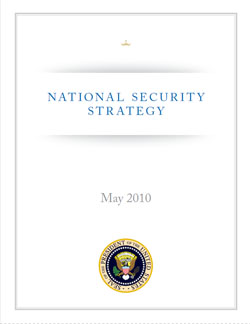

 The Obama Administration released its first National Security Strategy today, a document heavily rooted in the smart power principle of strengthening development and diplomacy alongside defense to meet the security challenges facing the United States. “Our diplomacy and development capabilities must be modernized, and our civilian expeditionary capacity strengthened, to support the full breadth of our priorities,” the strategy reads. “To succeed, we must update, balance, and integrate all of the tools of American power and work with our allies and partners to do the same.”
The Obama Administration released its first National Security Strategy today, a document heavily rooted in the smart power principle of strengthening development and diplomacy alongside defense to meet the security challenges facing the United States. “Our diplomacy and development capabilities must be modernized, and our civilian expeditionary capacity strengthened, to support the full breadth of our priorities,” the strategy reads. “To succeed, we must update, balance, and integrate all of the tools of American power and work with our allies and partners to do the same.”
The National Security Strategy makes it clear that modernizing and strengthening development and diplomacy is a top security priority, and the Obama Administration has made strong commitments to begin that work.
Echoing President Obama’s commencement speech at West Point on Saturday, during which he said that “The burdens of this century cannot fall on our soldiers alone,” the National Security Strategy repeatedly emphasizes the importance of building nonmilitary capacity and applying all tools of national power to the challenges of keeping America safe in a world of changing threats. Recognizing both the range of security challenges we face and the the critical roles diplomacy and development play in facing them, the National Security Strategy notes that, “Our diplomacy and development capabilities must help prevent conflict, spur economic growth, strengthen weak and failing states, lift people out of poverty, combat climate change and epidemic disease, and strengthen institutions of democratic growth.” To achieve those goals, the document goes on to pledge that, “We are increasing our foreign assistance, expanding our investments in effective multilateral development institutions, and leveraging the engagement of others to share the burden.”
The Strategy promises important changes to U.S. diplomacy and development, and we look forward to working with the Administration to make sure that these changes are supported through the Presidential Study Directive on Global Development (PSD), QDDR, and other processes.
Notifications